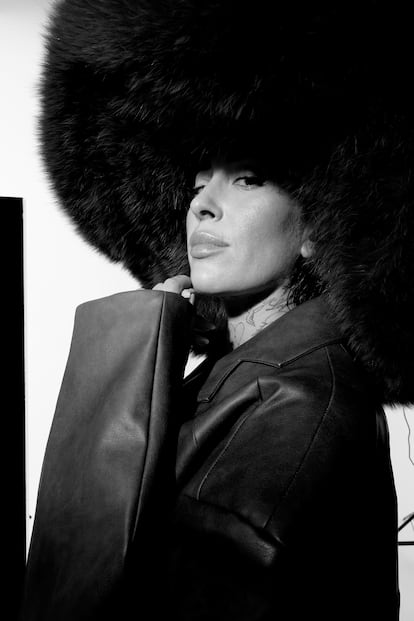Indira Paganotto is the DJ of the moment: "Women are indispensable in electronic music, and it's becoming clear."

She's imposing, knows what she wants, and has a Canarian accent, although she's half Salamanca, half Canarian, and half Italian. Her music is heard at the world's best festivals and the most iconic electronic music parties. She calls herself Psymama —she has it tattooed on her chest — but her name is clearly visible on the posters: Indira Paganotto (Gran Canaria, 33). The world's number 49 DJ, according to the specialized magazine DJ Mag , closed the main stage at Monegros a few days ago—she's the first woman to headline the closing act at the Aragonese desert festival—and is set to present her show at Dreambeach in Almería this weekend.
These are two of the most important electronic music festivals in Spain. But Indira Paganotto goes much further. She has performed at the popular Coachella in California, the revolutionary EXIT in Serbia, the sacred EDC Las Vegas, the techno temple Awakenings, and the number one, Tomorrowland, where her label ARTCORE had its own stage. Without a doubt, five of the most relevant musical events on the planet.
This is her year, she's the DJ of the moment, and she chatted with EL PAÍS hours before her July set at Tomorrowland, where she performed for the fourth consecutive year. Watching Indira Paganotto spin for two hours is an exercise in power and expressiveness, an energy she channels with wide smiles, rhythmic humming, and the movement of her arms. Her power behind the turntables is indomitable, as are her breaks , those moments of calm before the storm she often offers in her sets, epic silences that anticipate the madness. It's psytechno , the reason why her followers, whom she calls warriors , respond to the call of her howls—literally—to hear her unique sound: psytrance mixed with techno.
For Indira Paganotto, this entire tour and her latest steps are dreams that have come true, but not necessarily her best moments: “I've been there for many wonderful moments, even when I wasn't DJing as much or at this level, and I also consider them the best moments of my life. For example, when I lived in Madrid.”
Raised in the Gran Canarian town of Jinámar, her passion for music began there as a teenager: “I feel very Canarian, to the core, even though I don't have Canarian blood, but I was born and lived there.” In fact, her first opportunity was at the Moon Club in Las Palmas, before finally taking a definitive step when she came of age by moving to Madrid. She arrived in the capital with 200 euros in her pocket and ended up DJing at legendary venues like Stardust—where she was a resident for two years—and Trueno: “I loved that vibe, I didn't care about the money.” For a moment, she wanted to study medicine like her father and become a plastic surgeon, but she was already too wrapped up in music. Her father's musical library, which included playing Goa trance in India in the 1990s while he was there with Doctors Without Borders, was stronger than the operating room.
Her father, from Salamanca, and his vinyl collection have been decisive in her career, but her stage name comes from her mother, an Italian classical music lover: "Sorry, Dad," she adds humorously as she explains. And from this explosive mix, Indira Paganotto is born, who feels half Spanish and half Italian: "I grew up with my father's hippie vibe, where he walked around the house naked and ate with his hands; and with my mother, a northern Italian who listened to opera, made up from eight in the morning, and perfect. In other words, a total antagonism. That's why I'm not bipolar, I'm multipolar."

She's clear that there was a moment when she knew music was her thing: "I've always been very respectful and wanted to make my father see that I wanted to be like him, but I stuck with music and moved to Madrid." She pursued her dream and when she arrived, she started DJing at after-parties and hotels for 50 euros: "I wanted to be there, but without asking anyone for anything." She says that success has come slowly, through word of mouth: "I started to get back on my feet after 10 years of being there."
And if success took a while to arrive, in this city, love arrived a little more quickly: “I married a painter named David Morago when I was 19. I was married to him for 13 years, and they were the best years of my life. I miss them, not because of the marriage, which was also beautiful, but because of life in Madrid.” Until very recently, Paganotto lived in Valdemorillo, a mountain village. “I feel 80 years old,” she insists. And yes, it seems as if she's lived many lives.
It was in 2012 that she released her first EP, Underground Love. Between 2014 and 2022, she worked with three booking agencies and had a slew of releases on independent labels. She finally took a step forward: with Second State, she released her EP Red Ninja and shared her songs with Charlotte de Witte, who would end up releasing another EP by the Spaniard on her label, Himalaya . After a trip to India, she moved alone to Ankara, where she lived for a year, eventually returning to Gran Canaria.
In 2022, she decided to give shape to her creativity and launch her own record label and clothing and merchandise line: ARTCORE . “This project is a mix of art and hardcore . It’s like me, I’m a Gemini and I’m cute —adorable in Spanish—but psycho. She says they’re a crazy team of Spaniards and Italians, who are workaholics and constantly thinking, but they’re also a close-knit family: “If you see us, we’re different from other people because we don’t care about money, we only work for honor, loyalty, and family.”
Her most anticipated song by the public is Gipsy Queen , released in 2024 and with over four million streams on Spotify, where she also recently released Dragon , a collaboration with Armin Van Buuren, with whom she DJed at the last Sónar in Barcelona. Next up, in addition to a new clothing collection and continuing her residency at the Hï club in Ibiza, the best nightclub in the world, will be her next album: “It’s going to be released in winter, there are about twelve songs, a vinyl will be released and there will be some very interesting collaborations.”
The queens of electronicsIn a world dominated by men, women are more present than ever. Of these, Paganotto is the fourth best DJ in the world and is the only Spanish woman to make it into the top 50. "Women are there, I mean, they've always been there, but they're here more than ever. We're indispensable, and it's becoming apparent," she says. Alongside her, a generation of women born in the 1990s dominates current electronic music: Peggy Gou, Charlotte de Witte, Amelie Lens, and Sarah Landry, artists with whom she has collaborated and continues to enjoy performing live.
Precisely what Paganotto achieved last July in Monegros, closing the main stage of Spain's quintessential electronic music festival , was historic: "There are a lot of people who are freaking out and trembling about this. A lot of people are in favor, a lot of people are against, but that's what it means to be a woman in this country and to be strong. Not just for DJing, but for having your own business, having a great team, and making a different sound. Sometimes people are put off and just want the usual, but this year it won't be like that, so I'm preparing a hell of a set to make them proud," she said a week before DJing in front of tens of thousands of people in Monegros.

Cruz Arnau, co-founder of the Monegros Desert Festival and the promoter Elrow Family, praises Indira's courage in taking risks and exploring new sound territories without falling into familiar formulas: "She bravely took on one of the festival's most complex challenges: closing Monegros after more than 20 hours of music, in front of an audience as diverse as it was demanding. Her set was a personal commitment, with moments of great connection and a bold artistic direction that reflects precisely what we seek: authenticity, risk, and creative freedom on stage," she tells this newspaper.
Regarding the female presence in electronic music, Arnau insists that it has grown significantly in recent years and that Elrow Family's electronic music events around the world aim to reflect this evolution: "It's about giving visibility to an increasingly diverse scene, without forcing discourses but with a clear commitment to talent, wherever it comes from."
Tomorrowland spokesperson Debby Wilmsen explains to this newspaper that the visibility of female talent “is one of the most exciting developments of this time.” She insists that it's not just about the lineups, but about “representation and influence.” And she asserts that while the festival's 2022 lineup featured 15% female artists, it's now more than 20%. She gives the example of Belgian artist Charlotte de Witte, with whom Paganotto has shared a label and stage: “I used to perform under the name Raving George because I wasn't convinced they would book me any other way. She won a competition in 2010 and performed at Tomorrowland as Raving George. In 2025, she was able to open and close the main stage under her real name.”
EL PAÍS


%3Aformat(jpg)%3Aquality(99)%3Awatermark(f.elconfidencial.com%2Ffile%2Fbae%2Feea%2Ffde%2Fbaeeeafde1b3229287b0c008f7602058.png%2C0%2C275%2C1)%2Ff.elconfidencial.com%2Foriginal%2F185%2F99e%2Fe58%2F18599ee58ce6137df2e0335c4ba5b625.jpg&w=3840&q=100)

